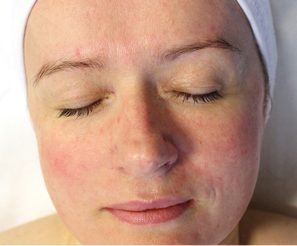Rosacea is a common skin condition that affects millions of people worldwide, often resulting in redness, visible blood vessels, and sometimes even acne-like breakouts. The condition can be frustrating and challenging to manage, impacting self-esteem and overall quality of life. Fortunately, there are various proven rosacea treatments available that can help individuals achieve a flawless complexion and restore their confidence.
Understanding Rosacea
Rosacea treatment in Dubai is a chronic inflammatory skin condition characterized by redness, flushing, and sometimes pustules or papules on the face. It commonly affects the central part of the face, including the cheeks, nose, forehead, and chin. While the exact cause of rosacea is not fully understood, several factors can trigger or exacerbate the condition, including sun exposure, stress, spicy foods, and certain skincare products.

Effective Rosacea Treatment Options
For those seeking a solution to manage and reduce the symptoms of rosacea, several proven rosacea treatment options can be highly effective. These treatments aim to control flare-ups, minimize redness, and improve the overall appearance of the skin.
Topical Medications
Topical medications are a cornerstone of rosacea treatment. They are applied directly to the skin and can help reduce inflammation, redness, and acne-like lesions. Common topical treatments include:
- Metronidazole: This antibiotic gel or cream is often prescribed to reduce inflammation and redness associated with rosacea.
- Azelaic Acid: Known for its anti-inflammatory properties, azelaic acid helps to diminish redness and reduce the appearance of bumps.
- Ivermectin: This topical treatment targets inflammation and is effective in treating rosacea-related papules and pustules.
Oral Medications
In cases of moderate to severe rosacea, oral medications may be prescribed. These systemic treatments can help control inflammation and address more persistent symptoms. Common oral medications include:
- Oral Antibiotics: Medications such as doxycycline or minocycline are frequently used to treat rosacea. They help reduce inflammation and bacterial growth.
- Oral Retinoids: For severe cases that do not respond to other treatments, oral retinoids like isotretinoin may be considered. These medications can reduce redness and breakouts by affecting skin cell turnover.
Laser and Light Therapies
For individuals with rosacea who struggle with persistent redness and visible blood vessels, laser and light therapies can offer significant improvement. These treatments target and reduce the appearance of blood vessels and redness. Some common options include:
- Pulsed Dye Laser (PDL): This laser treatment is effective in targeting and reducing redness by targeting blood vessels.
- Intense Pulsed Light (IPL): IPL therapy uses broad-spectrum light to target redness and improve skin tone by reducing visible blood vessels.
Skincare Regimens
An essential part of managing rosacea is adopting a gentle skincare regimen that avoids irritating ingredients. Here are some tips for creating an effective skincare routine:
- Use Gentle Cleansers: Opt for non-irritating, fragrance-free cleansers to avoid exacerbating rosacea symptoms.
- Avoid Alcohol-Based Products: Alcohol can be irritating to rosacea-prone skin, so choose hydrating, alcohol-free products.
- Moisturize Regularly: Keeping the skin hydrated is crucial for maintaining a healthy barrier and reducing redness.
Lifestyle Changes to Manage Rosacea
In addition to medical treatments, making certain lifestyle changes can help manage and reduce rosacea flare-ups:
- Protect Your Skin from Sun Exposure: Sun exposure is a common trigger for rosacea flare-ups. Use a broad-spectrum sunscreen with SPF 30 or higher daily.
- Identify and Avoid Triggers: Pay attention to potential triggers such as spicy foods, hot beverages, and extreme temperatures. Keeping a diary of your triggers can help you avoid them.
- Manage Stress: Stress can exacerbate rosacea symptoms, so incorporating stress-reducing practices like meditation, yoga, or exercise can be beneficial.
Combining Treatments for Optimal Results
For many individuals, a combination of treatments may provide the best results in managing rosacea and achieving a flawless complexion. It’s essential to work closely with a dermatologist to develop a personalized treatment plan that addresses your specific symptoms and needs.
Monitoring and Adjusting Your Treatment Plan
Effective management of rosacea often involves regular follow-up appointments with a dermatologist. These appointments allow for monitoring the condition’s progress and making any necessary adjustments to your treatment plan. If a particular treatment is not providing the desired results, your dermatologist may recommend alternative options or modifications to your regimen.
Conclusion
Achieving a flawless complexion with rosacea is possible with the right combination of treatments and lifestyle adjustments. Proven rosacea treatments, including topical and oral medications, laser therapies, and gentle skincare practices, can help manage symptoms and improve skin appearance. By working closely with a dermatologist and adopting a comprehensive approach to rosacea management, individuals can significantly reduce redness, inflammation, and other symptoms, leading to a more confident and radiant appearance.
This post was created with our nice and easy submission form. Create your post!





